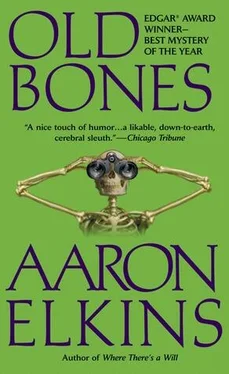Aaron Elkins - Old Bones
Здесь есть возможность читать онлайн «Aaron Elkins - Old Bones» весь текст электронной книги совершенно бесплатно (целиком полную версию без сокращений). В некоторых случаях можно слушать аудио, скачать через торрент в формате fb2 и присутствует краткое содержание. Жанр: Классический детектив, на английском языке. Описание произведения, (предисловие) а так же отзывы посетителей доступны на портале библиотеки ЛибКат.
- Название:Old Bones
- Автор:
- Жанр:
- Год:неизвестен
- ISBN:нет данных
- Рейтинг книги:3 / 5. Голосов: 1
-
Избранное:Добавить в избранное
- Отзывы:
-
Ваша оценка:
- 60
- 1
- 2
- 3
- 4
- 5
Old Bones: краткое содержание, описание и аннотация
Предлагаем к чтению аннотацию, описание, краткое содержание или предисловие (зависит от того, что написал сам автор книги «Old Bones»). Если вы не нашли необходимую информацию о книге — напишите в комментариях, мы постараемся отыскать её.
Old Bones — читать онлайн бесплатно полную книгу (весь текст) целиком
Ниже представлен текст книги, разбитый по страницам. Система сохранения места последней прочитанной страницы, позволяет с удобством читать онлайн бесплатно книгу «Old Bones», без необходимости каждый раз заново искать на чём Вы остановились. Поставьте закладку, и сможете в любой момент перейти на страницу, на которой закончили чтение.
Интервал:
Закладка:
"Yes. I’ve heard that the SS colonel who was in charge at the time was assassinated by the Resistance. Is that true?"
"So I’ve heard," said the barman nervously. "Thank you, monsieur."
He went back to the bar, leaving Gideon embarrassed and self-conscious. Asking sensitive questions of strangers in foreign places, particularly under scrutiny, was not something that came naturally to him. It was a good thing, he thought, as he had many times, that he’d switched to physical anthropology during his first year in graduate school. He’d have made a hell of a cultural anthropologist.
He drank some of the tart, cool cider from the bowl, turned his chair slightly away from the other table, and looked up at the black-and-white television set on a metal shelf over the bar. Out of the corner of his eye he saw the barman go to the table with the three men to report on his bizarre conversation with the newcomer. He drank some more cider. There was a Bugs Bunny cartoon on television. Bugs was wearing a waiter’s uniform (consisting entirely of a jacket with a towel over the arm). On a tray behind his back he had a cigar with a sputtering fuse sticking out of it. He was bending solicitously over a seated Elmer Fudd, who was elegantly dressed in quilted smoking jacket and ascot.
"Permettez-moi de vous servir, monsieur," said Bugs urbanely. "Voulez-vous encore un cigare?"
But Elmer wasn’t about to be had. "Non merci," he said, "je suis bien a mon aise."
What would "Bugs Bunny" be in French, he wondered idly- Lapin Fou? Insecte le Lapin? He didn’t find out. The oldest of the three men had come to his table and sat down. He was about eighty, a small man with eyes like shiny coffee beans, a nose like a zucchini, and a drooping but exuberant white moustache. His blue smock was covered with dark smudges and the cheerful, pungent aroma of shoe polish was all around him. The wrinkles on his otherwise clean fingers were lined with it, as if someone had carefully traced them with a pen.
"Bonjour," Gideon said again.
"American, eh?" the man responded.
"Yes, I am."
The man laughed. "I knew it as soon as I saw you. I told them." His French was rustic, thickened with a heavy Breton accent and hard to follow. "So you’re interested in Colonel Kassel, are you?"
"Well-"
"I can tell you what you want to know," the man said and smiled shrewdly. "I know who you are, you know. I know where you’re from."
"Pardon?"
The man laid a forefinger alongside his huge, pockmarked nose and leaned forward. "Say…Eee…Aah," he whispered.
"I’m afraid-" Gideon began in confusion, then laughed. The sounds were letters of the French alphabet. "CIA?" he said. "No, I’m a professor of anthropology. I teach-"
But the man only nodded his head conspiratorially.
"Wah… sheeng… ton," he whispered with the same respectful cadence. "Don’t try to fool me."
Gideon decided that maybe he wouldn’t. "Yes," he said solemnly, "I am from Washington." True enough, on its face.
"Aah," the man sighed with pleasure. "I thought so. I can always tell."
"What do you know about Colonel Kassel?" Gideon asked. He would have preferred being a little less direct and a little more polite, but he supposed that being an agent called for bolder style.
"What do I know?" Under the shapeless smock the thin, old shoulders shrugged. "I killed him."
Gideon blinked. " You killed him?"
The man was offended. He turned to his friends at the other table and called to them. "Hey-did I kill him or not?"
They knew immediately what he was talking about, and agreed loudly, with the barman joining in, that Jean-Honore Bourget had indeed killed him, and no one in the village would say otherwise.
Gideon, sensing that protocol called for it, invited them over and earned smiles and nods by ordering them another carafe of wine. Jean-Honore wondered politely if he might have a Pernod instead, and this was brought in a slender glass with an ice cube floating in it. He poured some water into it from a squat bottle with an "Anisette Berger" label on it, took a contented sip of the resulting milky-green liquid, and settled happily back to tell them all how he killed SS Obersturmbannfuhrer Helmut Kassel.
It was like watching a father deliver a familiar bedtime story to his children. When he couldn’t remember a detail, they supplied it for him, so they wound up telling a lot of it themselves, and when they contradicted him on a minor point, he said: "No, truly?" and went equably along with them. There was a lot of laughter.
But on the major points there were no contradictions, and no laughter either. In retribution for the murders of the six men named on the plaque, Jean-Honore and three other Maquis had done away with the SS man. One of the other three was the local barber, the second was a woman schoolteacher, and the third was the leader: Guillaume du Rocher. Only Jean-Honore was still alive.
Kassel, who had seen himself as a ladies’ man, had been lured to an afternoon assignation with the schoolteacher in the Hunadaie forest not far from town. There, they had killed him.
"How?" Gideon asked.
"With a claw hammer, mostly," the old man answered pleasantly. "Edmond wanted to use his razor, but Guillaume said it would be best to have no clean knife wounds." He nodded with approval. "He was right, too."
Working quickly, they had stripped him of his uniform, even his underwear, and dressed him in old farm clothes that smelled of pigs and manure. They carried him a few hundred feet to the road that runs between Ploujean and Plancoet. There Guillaume, whom the Nazis permitted to have a car because of his status and apparent docility, ran over him, making sure that his face was crushed against the asphalt. The body was left in the road to be found by the authorities-some drunken peasant who’d stepped in the way of a transport truck or a speeding staff car-and that was the end of that.
"But wasn’t there any retribution? Didn’t the Nazis-"
Jean-Honore grinned. "Not very smart, the Boches."
"Well, you see," one of the others explained, "the last thing the SS wanted was to let it out that somebody with a rank like that might have been assassinated. They didn’t want us to know, and they certainly didn’t want Berlin to know. And as for the regular army, the regular administration, they just wanted the SS out of here, the sooner the better; they hated them more than we did."
"As much, maybe," Jean-Honore said. "Not more."
"As much," the man agreed. "So in the end they settled for the story that he just disappeared on one of his little trips to somewhere or other; one of his private, unannounced‘investigations’ to the Argoat, or the Morbihan, or maybe Normandy. Nobody knew where."
"Anywhere but this district," Jean-Honore said. "Bureaucrats are the same everywhere." He finished his Pernod with a sigh, turned down the offer of another, wiped the ends of his moustache between thumb and forefinger, and looked with sparkling little eyes at his satisfied audience.
"What did you do with Kassel’s uniform?" Gideon asked.
"What kind of a question is that?" the barman said.
"No, why shouldn’t he ask?" Jean-Honore said. He shot a melodramatically cryptic glance to Gideon. "He has to know many things." Gideon nodded, soberly and mysteriously.
"The uniform…" mused Jean-Honore, searching his mind.
"You burned it," said one of the others.
" Burned it?" Gideon said.
"Oh, yes, that’s right…" said Jean-Honore. "Well, the parts that would burn without making a stink; the cloth parts. The rest Guillaume took away with him to bury somewhere. In his wine cellar, maybe," he said and laughed. "My God, it hurt to bury those boots. You should have seen what we were wearing for shoes."
So that explained that, and much to Gideon’s satisfaction. The SS regalia simply had no connection with the bones in the cellar. Two separate murders, two separate burials. No relationship beyond the fact that one had been executed by the other, and the other killed to avenge him. So much for the SS insignia that had so pleased Joly.
Читать дальшеИнтервал:
Закладка:
Похожие книги на «Old Bones»
Представляем Вашему вниманию похожие книги на «Old Bones» списком для выбора. Мы отобрали схожую по названию и смыслу литературу в надежде предоставить читателям больше вариантов отыскать новые, интересные, ещё непрочитанные произведения.
Обсуждение, отзывы о книге «Old Bones» и просто собственные мнения читателей. Оставьте ваши комментарии, напишите, что Вы думаете о произведении, его смысле или главных героях. Укажите что конкретно понравилось, а что нет, и почему Вы так считаете.












